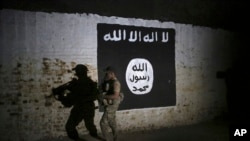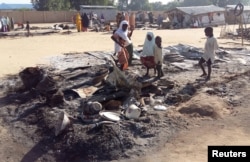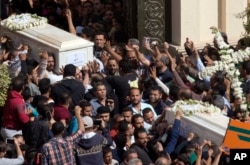Driven from its self-styled caliphate in Iraq and Syria, Islamic State is down but not out.
Where once they confronted armies, the extremist Islamist group's adherents have now staged hit-and-run raids and suicide attacks. In some cases, the group has claimed responsibility for atrocities, including the bombings of churches and hotels in Sri Lanka that killed more than 350 people.
Its involvement is not always proven, but even if the link is ideological rather than operational, Islamic State still poses a security threat in many countries.
Iraq
After its defeat by U.S.-backed forces, IS has reverted to the guerrilla tactics it was once known for. Sleeper cells have regrouped in Diyala, Salaheddin, Anbar, Kirkuk and Nineveh provinces, where they carry out frequent attacks, including kidnappings and bombings aimed at undermining the Baghdad government.
In February, two people were killed and 24 wounded when a car bomb went off in Mosul, once the group's Iraqi capital.
The Pentagon said in January that IS was regenerating faster in Iraq than in Syria. Analysts estimate that 2,000 active combatants now operate in Iraq.
Syria
After serious military setbacks, IS slipped into the shadows, staging suicide bombings and ambushes.
IS has carried out bomb attacks in towns and cities of northeast Syria in recent months, including some targeting U.S. forces.
Syrian Kurdish forces, which control the region and crushed the jihadists with U.S. help, have sounded the alarm about the group's new tactics.
They believe sleeper cells have mushroomed across eastern Syria and expect guerrilla attacks to escalate. They also warn of the risk posed by holding thousands of militants in prison camps.
IS fighters still hold some ground in Syria's remote central desert, where they have staged attacks in recent days.
Nigeria
Nigerian group Boko Haram has carried out attacks in the northeast since 2009 in pursuit of a caliphate. It has killed 30,000 people and forced 2 million to flee their homes.
The group split in 2016 and one faction pledged allegiance to IS. Islamic State's West Africa Province (ISWAP) has focused on attacking military bases in raids over the last year. It has become the dominant militant group in the region as a result of these raids.
ISWAP's activities are concentrated around Lake Chad, which borders Nigeria, Cameroon, Chad and Niger.
IS claims attacks in the Lake Chad region through its Amaq news agency. However, the extent of support provided by Islamic State to ISWAP is unclear and many security experts say the relationship is mainly in name rather than direct funding and logistical support.
Numbers are hard to pin down, but analysts put ISWAP's strength at between 5,000 and 18,000.
ISWAP raises money through taxes on traders, smugglers and fishermen in the Lake Chad region. Inducements such as seeds and fertilizer have also been offered to locals.
Egypt
Egypt has seen no large attacks over the past year, but smaller incidents persist and the military is mounting a campaign against Islamist insurgents, mainly on the Sinai Peninsula.
The military says several hundred militants have been killed since it launched a major campaign in February 2018 to defeat fighters linked to Islamic State in Sinai.
Three civilians and four police personnel were killed this month by a suicide bomber in the North Sinai town of Sheikh Zuweid, the Interior Ministry said. Claiming the attack, IS said 15 people were killed or wounded.
In November, gunmen killed seven Christians on a bus in Minya province, south of Cairo. IS claimed responsibility.
H.A. Hellyer, senior associate fellow at the Royal United Services Institute (RUSI) and the Atlantic Council in London, said IS remains a threat in Egypt via two avenues: in the Sinai Peninsula, where part of the Ansar Bayt al-Maqdis group pledged allegiance to IS years ago; and in sporadic cells elsewhere, made up of more recent recruits and possibly returning fighters from Syria and Iraq.
Saudi Arabia
IS militants have carried out deadly bombings and shootings in Saudi Arabia against security forces and minority Shiite Muslims, after the authorities crushed an al-Qaida insurgency over a decade ago.
Saudi security forces said they foiled an attack by four IS militants north of Riyadh on Sunday, and arrested 13 others on Monday in connection with planning other attacks.
The security forces also raided a house they said the militants were using as a bomb factory, and seized suicide vests, homemade bombs, rifles and IS publications.
On Tuesday, the Interior Ministry said it had executed 37 people "for adopting extremist terrorist ideologies and forming terrorist cells to corrupt and disrupt security as well as spread chaos and provoke sectarian strife."
Kamran Bokhari, a director at the Center for Global Policy, a Washington research group, said IS does exist in the kingdom but the Saudi security forces and intelligence service are "pretty much on top of things."
Bokhari said that from IS's point of view, Saudi Arabia is "the grand prize" because of because of the kingdom's oil wealth and its prominent position in the Islamic world.
Michael Stephens, research fellow for Middle East Studies at London's RUSI think tank, said the Saudi security forces are tracking a few hundred people, including some who have been to Syria, but there is no evidence that they have become operational.
Afghanistan
Islamic State in Khorasan (ISIS-K), which took its name from an historical region that covered much of modern-day Afghanistan and parts of Central Asia, appeared in late 2014 in the eastern province of Nangarhar, where it retains a stronghold. It announced its formation in January 2015.
The group's leadership has pledged allegiance to Abu Bakr al-Baghdadi, the leader of IS, but it is not clear that ISIS-K has direct operational links with the main movement.
It has claimed attacks on civilian targets in cities including Kabul and fought the Afghan Taliban for control of a number of rural districts. U.S. commanders say its forces number fewer than 2,000.
The movement is little understood and many Afghan officials in Kabul doubt the veracity of some of its claims of responsibility.
Democratic Republic of the Congo
Islamic State claimed its first attack in Congo on Thursday, and declared it the "Central Africa Province" of the "Caliphate."
Congo's President Felix Tshisekedi said the defeat of IS in Syria and Iraq meant the group might come to Africa and take advantage of poverty and chaos in an attempt to set up a caliphate.
A spokesman for the U.S. Africa Command said the Allied Democratic Forces, a local militant group, had meaningful ties to Islamic State, to which it claimed allegiance in 2017.
Yet analysts see scant evidence for this. Marcel Heritier Kapiteni, a Belgian-based Congolese researcher, said there were no clear links between ADF activity and "international terrorism."
He said it was likely that Islamic State was taking false credit for the Congo attack. IS "is losing battles in the usual bastions, which is pushing it to embark on a media war," he said. "But the DRC's terrain is not socially favorable to radical Islam."
Sri Lanka
Islamic State claimed the Easter Sunday bomb attacks on churches and hotels and released a video showing eight men declaring loyalty to Baghdadi.
IS claims the men in the video, released on Tuesday by its Amaq news agency, carried out the suicide bombings.
One man in the video is Mohamed Zahran. Sri Lankan intelligence officials believe that Zahran, a Tamil-speaking preacher well-known for his militant views, may have masterminded the attacks.
Sri Lankan officials have blamed two domestic Islamist groups with suspected ties to Islamic State. The scale and sophistication of the attacks suggested the involvement of an external group such as Islamic State, said Alaina Teplitz, the U.S. ambassador to Sri Lanka.
Indonesia
Indonesia is the world's most populous Muslim-majority country and most people practice a moderate form of Islam. But there has been a resurgence in militancy, and authorities have said they believe thousands of Indonesians draw inspiration from Islamic State, while about 500 Indonesians are thought to have gone to Syria to join the group.
A court sentenced a cleric, Aman Abdurrahman, to death last year for masterminding deadly attacks. Abdurrahman is considered the ideological leader of Jemaah Ansharut Daulah (JAD), a loose grouping of Islamic State sympathizers in Indonesia.
Suicide bombings in May last year in Surabaya that killed more than 30 were linked to JAD cells.
The Philippines
The Philippines fears that extremists fleeing Iraq and Syria could find a safe haven in the jungles and remote villages of Muslim areas of Mindanao, where there is a long history of lawlessness, clan rivalry, and separatist and Islamist rebellion.
Several splinters of the myriad armed groups in the southern Philippines have pledged allegiance to Islamic State, although none are known to have been endorsed as its Southeast Asian affiliate.
Islamic State often claims responsibility for bombings and rebel clashes with government troops in Mindanao, but their veracity is often disputed.
Security experts are concerned Islamic State could, through offers of money or through radical teachings, find fertile recruitment ground among disenfranchised youth in Muslim Mindanao.









